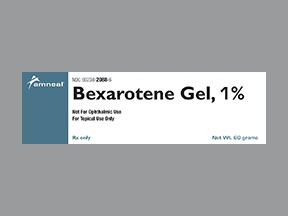
Bexarotene Coupons & Savings Card – Discount Prices from $5669.72
Generic for: Targretin
My prescription
Edit
60GM of 1%, Bexarotene (1 Tube)
Select pharmacy

Albertsons
$5669.72
COUPON PRICE
Walgreens
$7254.00
COUPON PRICEBexarotene savings card
Show this card to your pharmacist
Albertsons
$5669.72
BIN
ID
PCN
GRP
019876
LH9BD2DB81
CHIPPO
LHX
Powered by
More prescriptions for Hodgkin's lymphoma
More prescriptions for Hodgkin's lymphoma
Price history for Targretin (brand) & Bexarotene (generic)
1 Tube, 60GM
Average retail price for Targretin
Average retail price for Bexarotene
Average SaveHealth price for Bexarotene
Our price history data is based on aggregated prescription data collected from participating pharmacies in America. Our prescription data updates daily to reflect the latest price changes. If you notice a missing data point, it means there wasn't sufficient data available to generate a monetary value for that date.
We analyzed Bexarotene prices for (60GM, 1 Tube) over the last 12 months. The average retail price was $39145.96, while the average price using the SaveHealth discount card was $14481.97. That's a savings of approximately 63.01% when using our Bexarotene coupon.
Compared to the generic version, Targretin had an average price of $41451.53 over the same time period. With the SaveHealth savings card, Bexarotene is 65.06% cheaper on average than Targretin.
*Retail prices are based on pharmacy claims data, and may not be accurate when we don't have enough claims.
Bexarotene dosage forms
Dosage Quantity Price from Per unit 60GM 1 Tube $5669.72 $5669.72 60GM 2 Tubes $11331.94 $5665.97 60GM 3 Tubes $16994.17 $5664.72
| Dosage | Quantity | Price from | Per unit |
|---|---|---|---|
| 60GM | 1 Tube | $5669.72 | $5669.72 |
| 60GM | 2 Tubes | $11331.94 | $5665.97 |
| 60GM | 3 Tubes | $16994.17 | $5664.72 |
